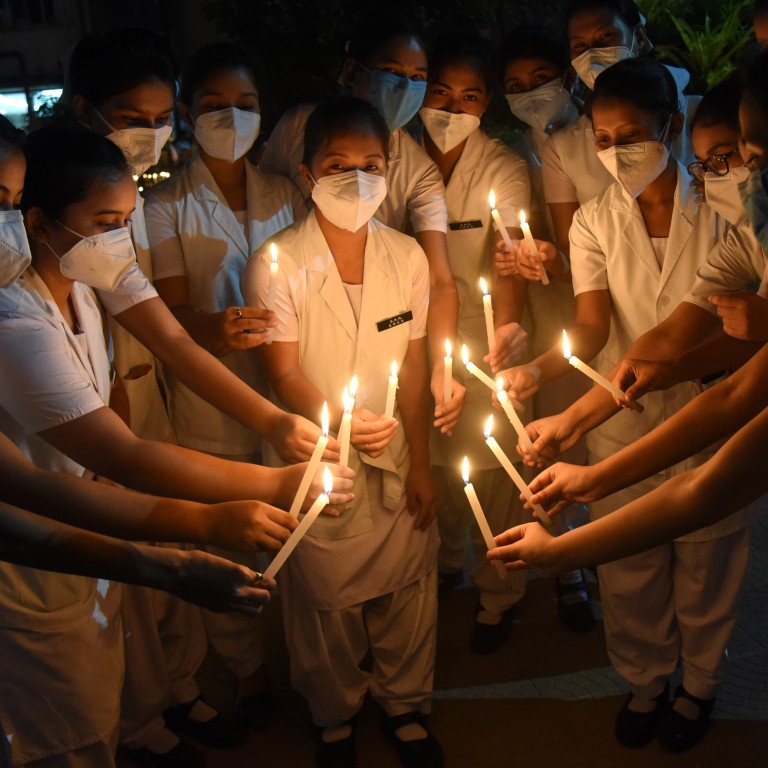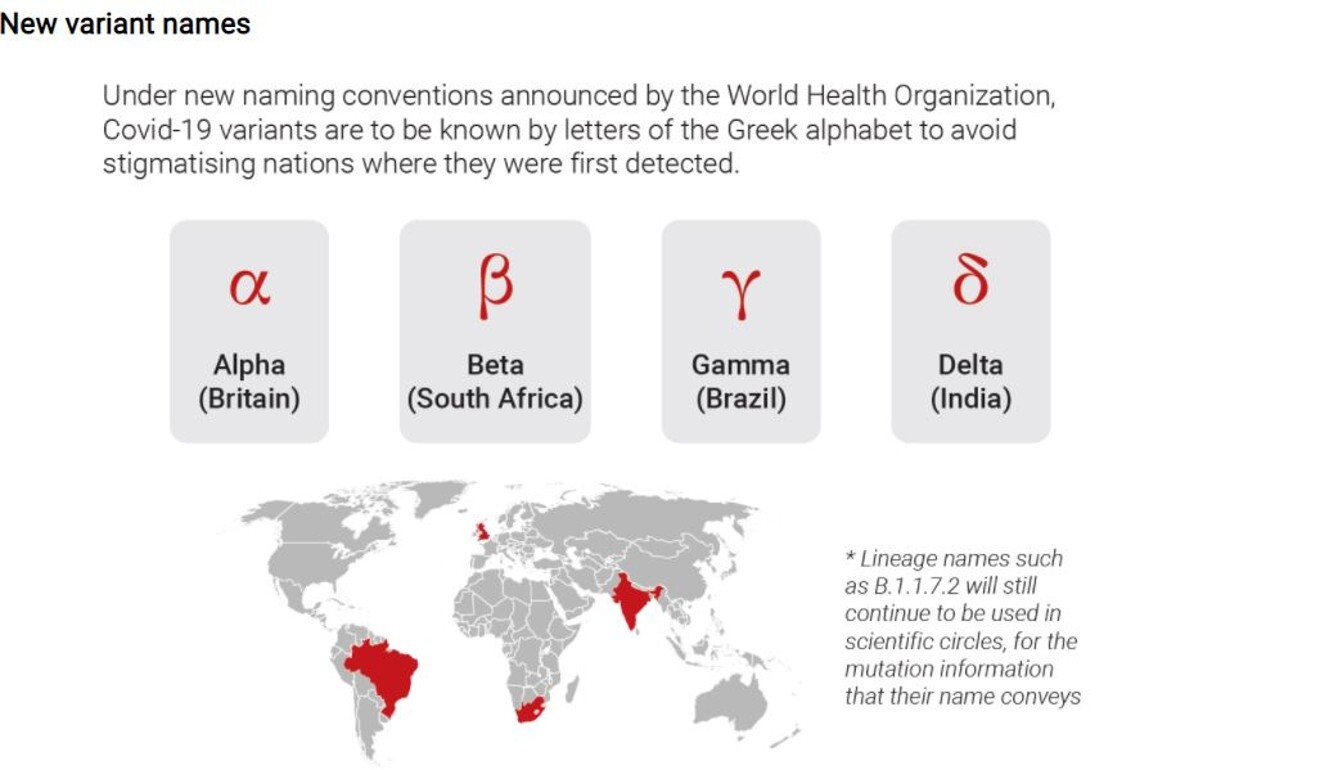
Coronavirus: India’s death toll reaches 400,000; Australia tightens cap on international arrivals
- Experts believe India may have undercounted deaths significantly and the actual number could have reached 1 million or even higher
- Australian cities Sydney, Brisbane and Perth – home to about 10 million people – are currently in lockdown
India has recorded 30.45 million cases since the outbreak of the pandemic last year, and is the second-most affected country behind the United States, which has 33 million cases. The US has more than 604,000 deaths and about 518,000 people have died in Brazil.
India, the world’s second-most populous nation, recorded 853 deaths in the past 24 hours, health ministry data showed on Friday. That took it past the 400,000 mark, with the last 100,000 being added in just 39 days.
India’s Covid-19 patients have a new problem: cytomegalovirus
But health experts believe India may have undercounted deaths significantly and the actual number could have reached 1 million or even higher.
Scores of bodies washed up along the Ganges river in northern India in May, as people struggled to keep pace with deaths and cremations at the peak of the second wave.
“Undercounting of deaths is something that has happened across states, mostly because of lags in the system, so that means we will never have a true idea of how many people we lost in this second wave,” said Rijo M John, a professor at the Rajagiri College of Social Sciences in the southern city of Kochi.
Last month, Bihar, one of India’s poorest states, revised its total Covid-19 death toll to 9,429 from 5,424, after an order from a local court.
India recorded a total of 200,000 deaths at the end of April, but took just 28 days to get to 300,000 deaths.
Hospitals ran out of beds and life-saving oxygen during the second wave in April and May and people died in car parks outside hospitals and at their homes.
Cases have declined steadily since hitting a peak in May, but government officials and experts have warned that a third wave looms, as the country slowly reopens and a new variant, locally called the Delta Plus, rears its head.
Australia tightens cap on international arrivals
Australia on Friday announced a dramatic cut in the number of people who will be allowed to enter the country as it struggles to contain coronavirus clusters that plunged major cities into lockdown.
With almost half of the nation’s population under stay-at-home orders, Prime Minister Scott Morrison said quotas for overseas arrivals would be cut by around 50 per cent to help prevent further outbreaks.
Under the current “zero Covid” strategy, just 6,000 people are allowed to enter Australia on overseas commercial flights each week and arrivals must undergo mandatory two weeks of hotel quarantine.
As Delta spreads in Asia, anti-parasitic drug ivermectin is hot property
That quota will be cut to around 3,000 by the middle of July, Morrison indicated, although the government will at the same time step up its private repatriation flights.
Morrison announced the decision amid growing anger over repeated snap lockdowns, the leakiness of hotel quarantine facilities and what critics have dubbed a vaccine “stroll out”.
More than 18 months into the pandemic, less than 8 per cent of adults have been fully vaccinated.
“This is a difficult time when people are dealing with restriction,” Morrison said. “There is still quite a journey ahead of us.”
Sydney, Brisbane and Perth are currently in lockdown – a total of around 10 million people – in an effort to suppress outbreaks that delivered 27 new local cases on Thursday.
Although shutdowns are being lifted in Alice Springs, Darwin and Queensland’s Gold Coast, the clusters continue to grow, particularly in Sydney.
Trying to address growing anger at the prospect of border restrictions entering their second year, Morrison previewed a “new deal” that would shift the country’s strategy from suppressing coronavirus to managing it.
The government, he said, would soon adopt vaccination targets, which when reached, would allow the gradual opening of borders and a return to normal life. He indicated borders would open first for vaccinated Australians and overseas travellers, who could also be subject to reduced quarantine requirements.
South Korea’s cases hit six-month high
The Korea Disease Control and Prevention Agency (KDCA) reported 826 cases, up from 762 the day before and the highest since Jan. 7 when the country was grappling with a third wave of Covid-19.
Almost 81 per cent of the 765 locally transmitted cases came from the capital, Seoul, and its surrounding regions, KDCA data showed.
The government had said it would relax social distancing measures this month as daily new cases hovered around 500 and the vaccination drive accelerated.
But days before restrictions on movements were to be eased, case numbers shot up and authorities in Seoul and surrounding areas extended restrictions for another week to July 7.
“More than 80 per cent of new cases have come from the Seoul metropolitan area for a third straight day on the back of cluster infections from restaurants and private educational institutions,” Interior and Safety Minister Jeon Hae-cheol told an intra-agency Covid-19 meeting.
“We’re extremely concerned the virus would spread further as there are clear signs of increased outside activity among the people, and a rising number of cases of the strongly transmissible Delta variant.”

The government has urged people to keep wearing masks indoors and refrain from unnecessary outings even as the inoculation drive makes progress.
Authorities are particularly concerned about a new outbreak traced to an English-language academy just outside the capital, with at least 242 cases including the Delta variant confirmed there.
“We have concerns that outbreaks could increase explosively if distancing is relaxed, as there would be more people-to-people contact through drinking or exposure at various public facilities,” KDCA director Jeong Eun-kyeong told a briefing on Thursday.
Myanmar orders 2 million to stay home
Inhabitants of Mandalay, as well as two townships in the southern Bago region woke up to new restrictions banning more than one person leaving home for non-medical reasons.
There was no timeframe given for the new rules, announced by the health and sports ministry of the State Administration Council – as the junta calls itself.
Those travelling to government jobs are exempted.
The affected areas are home to more than two million people, according to a 2014 census, and join towns in western Chin state near the Indian border that have been locked down since May.
Authorities reported more than 1,500 new cases on Thursday, up from around 100 per day in early June.
Myanmar’s creaking health care system had struggled to respond to Covid-19 even before the February coup that ousted Aung San Suu Kyi.
Since the coup, thousands of doctors, volunteers and civil servants have joined a mass civil disobedience campaign to protest against the military regime.
Myanmar has reported 3,347 virus-related deaths, although true figures are likely to be higher.
A shipment of 1.5 million vaccines arrived from India earlier this year.
On Thursday, state media reported junta leader Min Aung Hlaing had agreed to buy two million vaccines from Russia, without specifying which shot.
A spokeswoman from the health ministry said last week that authorities were also negotiating with China to buy more vaccines.
Japan to supply 3 million vaccines to Pacific nations
Suga’s announcement came as the leaders of Japan and Pacific island nations and territories affirmed cooperation in an online meeting toward the realisation of a free and open Indo-Pacific, in an apparent effort to counter China’s growing influence in the region.
In the virtual meeting, Japan also pledged assistance to help Pacific countries recover from the coronavirus pandemic by strengthening health care and medical systems, providing economic relief, and improving infrastructure facilities among other measures, according to Japanese government officials.
Can Japan counter China’s vaccine diplomacy with Southeast Asian donations?
The ninth Pacific Islands Leaders Meeting was attended by representatives of Japan, 14 Pacific island nations, Australia and New Zealand, as well as French Polynesia and New Caledonia, both French administrative divisions.
The islands are of strategic importance to Tokyo in both the economic and security arenas, the Japanese Foreign Ministry said.
Reporting by Reuters, Agence France-Presse, Kyodo
